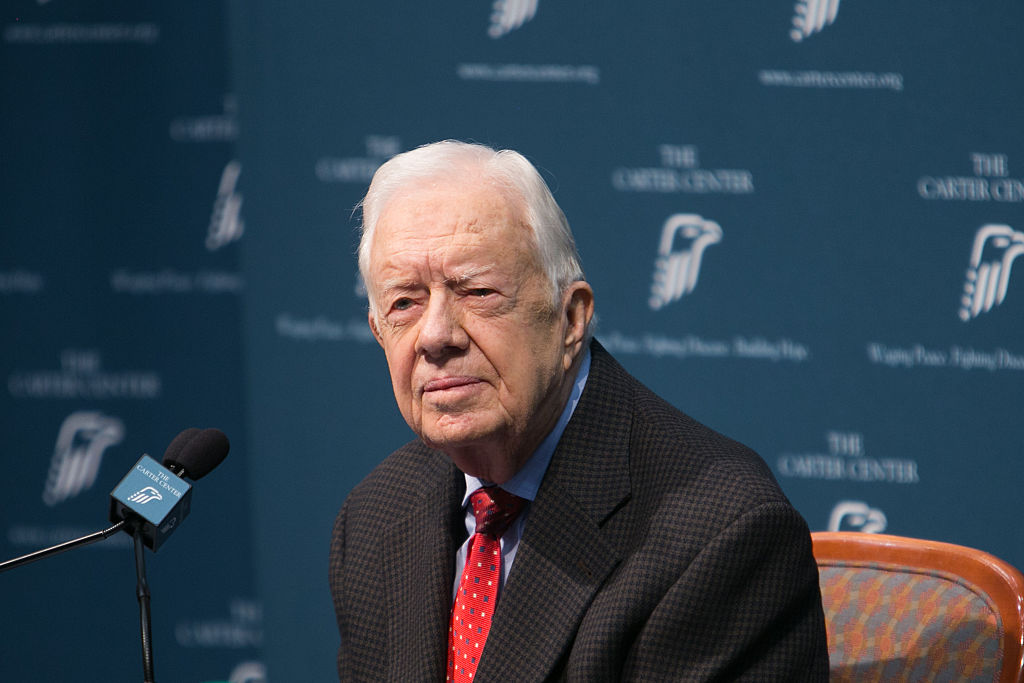The nation bids farewell to former U.S. President Jimmy Carter, whose passing at the age of 100 on Sunday marked the end of an era. Funeral arrangements are underway, with Carter set to be laid to rest in his beloved hometown of Plains, Georgia, where he and his wife, Rosalynn, chose their final resting place decades ago. This solemn moment shines a spotlight on the unique tradition of American presidential funerals, often meticulously planned by the presidents themselves, revealing their values and personal philosophies.
A Farewell Decades in the Making
Carter, whose post-presidency spanned an unprecedented 43 years, leaves behind a legacy of service, humility, and dedication. President Joe Biden, honoring a personal request from Carter, confirmed he would deliver the eulogy. Biden also announced a state funeral in Washington, D.C., on January 9, accompanied by a National Day of Mourning. U.S. flags will fly at half-staff for 30 days in tribute to Carter’s life and contributions.
Presidential funerals hold a significant place in American history, blending personal tributes with state traditions. For Carter, a man who grew up on a peanut farm before rising to the presidency, these proceedings are expected to reflect his lifelong commitment to humility and humanity. Details of the state funeral, which will include lying in state, processions, religious services, and military honors, are being coordinated by the Joint Task Force-National Capital Region.
Presidential Farewells: A Window into Legacy
Presidential funerals are often shaped by the leaders themselves, highlighting their values and aspirations. Dwight D. Eisenhower, a World War II hero, opted for a simple government-issued casket to honor his military roots. George H.W. Bush meticulously reviewed seating charts, ensuring inclusivity. Ronald Reagan’s procession up the U.S. Capitol’s west steps symbolized his Californian beginnings, while John F. Kennedy’s funeral captivated the world with its poignant imagery, including his young son’s iconic salute.
Historians underscore the profound impact of these events on national memory. “They are very much involved in the planning process,” said Matthew Costello of the White House Historical Association. “The decisions they make tell us a lot about who they are and how they want to be remembered.”
Netizens React to Carter’s Legacy
Social media users expressed a mix of admiration and nostalgia for Carter’s life and the upcoming tributes.
User @PeanutFarmPride commented, “Jimmy Carter embodied humility. Plains, Georgia, will forever be a symbol of his unwavering spirit.” Another user, @HistoryBuff87, tweeted, “Carter’s legacy proves that service doesn’t end with the presidency. A true role model for all.”
Others reflected on the broader significance of presidential funerals. “These ceremonies remind us of the humanity behind leadership,” wrote @AmericanHeart76. Meanwhile, @LegacyLover92 shared, “Presidential funerals are like history unfolding. Carter’s will be no different.” User @GlobalCitizen44 added, “Biden’s eulogy will undoubtedly capture the essence of a life well-lived.”
Finally, @RespectOurLeaders posted, “From peanut farmer to Nobel Peace Prize laureate, Jimmy Carter’s journey will inspire generations.”



 Failure of US-Iran talks was all-too predictable – but Trump could still have stuck with diplomacy over strikes
Failure of US-Iran talks was all-too predictable – but Trump could still have stuck with diplomacy over strikes  Israel Strikes Hezbollah Targets in Lebanon After Missile and Drone Attacks
Israel Strikes Hezbollah Targets in Lebanon After Missile and Drone Attacks  Trump and Merz Meet at White House Amid Iran Strikes and Trade Tensions
Trump and Merz Meet at White House Amid Iran Strikes and Trade Tensions  Pentagon Downplays ‘Endless War’ Fears After U.S. Strikes on Iran Escalate Conflict
Pentagon Downplays ‘Endless War’ Fears After U.S. Strikes on Iran Escalate Conflict  Trump’s Iran Strikes Spark War Powers Clash in Congress
Trump’s Iran Strikes Spark War Powers Clash in Congress  Trump Says U.S. Attacks on Iran Will Continue, Warns of More American Casualties
Trump Says U.S. Attacks on Iran Will Continue, Warns of More American Casualties  Iran Detains U.S. Citizens Amid Escalating Conflict With the United States and Israel
Iran Detains U.S. Citizens Amid Escalating Conflict With the United States and Israel  Middle East Conflict Escalates After Khamenei’s Death as U.S., Israel and Iran Exchange Strikes
Middle East Conflict Escalates After Khamenei’s Death as U.S., Israel and Iran Exchange Strikes  Trump Says U.S. Combat Operations in Iran Will Continue Until Objectives Are Met
Trump Says U.S. Combat Operations in Iran Will Continue Until Objectives Are Met  Israel Prepares Weeks-Long Military Campaign Against Iran Amid Escalating Air Strikes
Israel Prepares Weeks-Long Military Campaign Against Iran Amid Escalating Air Strikes  Why did Iran bomb Dubai? A Middle East expert explains the regional alliances at play
Why did Iran bomb Dubai? A Middle East expert explains the regional alliances at play  Rubio Says U.S. Would Not Target School After Deadly Iran Strike Reports
Rubio Says U.S. Would Not Target School After Deadly Iran Strike Reports  Trump Announces U.S. Strikes on Iran Navy as Conflict Escalates
Trump Announces U.S. Strikes on Iran Navy as Conflict Escalates  Marco Rubio to Brief Congress After U.S.-Israeli Strikes on Iran
Marco Rubio to Brief Congress After U.S.-Israeli Strikes on Iran  Trump Says U.S.-UK Relationship Has Deteriorated After Starmer Hesitates on Iran Strikes
Trump Says U.S.-UK Relationship Has Deteriorated After Starmer Hesitates on Iran Strikes  AI is already creeping into election campaigns. NZ’s rules aren’t ready
AI is already creeping into election campaigns. NZ’s rules aren’t ready  Australia Rules Out Military Involvement in Iran Conflict as Middle East Tensions Escalate
Australia Rules Out Military Involvement in Iran Conflict as Middle East Tensions Escalate 































